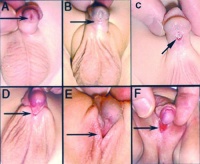Template:Hypospadias Classification Table: Difference between revisions
From Embryology
mNo edit summary |
mNo edit summary |
||
| Line 3: | Line 3: | ||
|-bgcolor="CEDFF2" | |-bgcolor="CEDFF2" | ||
! Classification | ! Classification | ||
! | ! [[International_Classification_of_Diseases|ICD-10]] | ||
! Meatus Opening | ! Meatus Opening | ||
! Image | ! Image | ||
| Line 38: | Line 38: | ||
| F | | F | ||
|- | |- | ||
| colspan=3|Table reference{{#pmid:11713004|PMID11713004}} | | colspan=3|Table reference{{#pmid:11713004|PMID11713004}} Links: {{hypospadias}} | ||
|}<noinclude>[[Category:Template]][[Category:Table]][[Category:Abnormal Development]][[Category:Male]][[Category:Genital]]</noinclude> | |}<noinclude>[[Category:Template]][[Category:Table]][[Category:Abnormal Development]][[Category:Male]][[Category:Genital]]</noinclude> | ||
Revision as of 19:28, 14 May 2018
| Classification | ICD-10 | Meatus Opening | Image | 
|
|---|---|---|---|---|
| Anterior | Q54.1 Hypospadias, penile | on inferior surface of glans penis | A | |
| Q54.0 Hypospadias, balanic Hypospadias: coronal glandular | Coronal | in balanopenile furrow | B | |
| Distal | Q54.0 Hypospadias, balanic Hypospadias: coronal glandular | on distal third of shaft | C | |
| Penoscrotal | Q54.2 Hypospadias, penoscrotal | at base of shaft in front of scrotum | D | |
| Scrotal | on scrotum or between the genital swellings | E | ||
| Perineal | Q54.3 Hypospadias, perineal | behind scrotum or genital swellings | F | |
| Table reference[1] Links: hypospadias | ||||